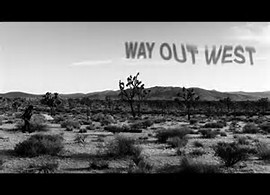Rating: 10/10
Recently, a friend of mine, James, was wondering which country song was, in his words, “the most satisfying musically.” He stipulated that lyrics could not be taken into account; he wanted a song that stood out simply for its musicality. He had asked my boyfriend Rob, a fellow fan and student of country music, and Rob and I were stumped for some time. It’s more of a difficult question than it seems because country is a lyric-driven genre. Musical arrangements are generally simple, and it’s hard to find something especially mind-blowing musically within a genre that relies so heavily on storytelling to make its points. The best answer I could come up with at the time was Reba’s “The Night the Lights went out in Georgia.” but I didn’t have access to this album then. Way out West has not earned this rating for its lyrical content, and I think it will be misunderstood and perhaps underappreciated by some for that reason. Country listeners generally look for a story, for honest and clever songwriting, and that part of this record won’t blow you away. but what Marty Stuart has done here musically, capturing a place and time and setting it so perfectly to music, cannot be ignored, and the fact that his vision did not come lyrically makes it even more of a risk within the country format and therefore all the more remarkable.
That’s not to say that the lyrics are a weak point of this album, but you won’t find moments of lyrical brilliance. On a good portion of it, you won’t find lyrics at all. They seem to be placed into songs almost as an afterthought, and only where they belong. Probably the best songwriting comes on the title track, and there are some nice lyrical moments in “air Mail Special,” “Whole Lotta Highway,” and “Please don’t Say Goodbye” as well. As I say, it’s certainly not a weak point, but there is no cohesive story running through this record in the lyrics, and they won’t blow you out of the water on their own.
The story, and the thing that will blow you out of the water, is in the music and mood. The songs and lyrics aren’t all about the American West, but this record is western through and through. Like last year’s Southern Family, this is a portrait of a place and culture. But Southern Family relied on stories to be southern; this record relies on sound and mood to be western. There’s Native American influence and Mexican influence too, arguably making this an even better representation than Southern Family, a record noticeably lacking in African-American influence and thus ignoring a major part of Southern culture. Marty Stuart recognizes that Native American and Mexican influence are as important in painting a portrait of the west as desert ballads. The aforementioned “Please don’t Say Goodbye” has absolutely nothing to do with the West; you won’t even hear references to deserts or California or wide open spaces here, like you do on some of the other tracks that otherwise aren’t really about the West, but there’s still no doubt that this song is western and belongs on the record. It’s in the music and mood, and it allows Marty Stuart to explore other lyrical themes and still produce a cohesive album.
It’s also why there are so many instrumental tracks and why this review isn’t a track-by-track affair. When you drive across west Texas, and there’s emptiness around you for miles, words can’t do justice to the way you feel. The same thing applies to the mountains in Colorado and the Badlands in South Dakota. Words would be inadequate to describe any of this, and yet somehow this record paints pictures of it all. You get the feeling listening that Marty Stuart felt that, in some places, words would just be interrupting, and far be it for me to take an experience like this and break it down into words and tracks. And by the way, credit to The fabulous Superlatives, relied on so heavily to make this album and these pictures come alive.
All I can say about this record is go listen to it. Nothing I can write here will do it justice because it is an album meant to be heard to be fully appreciated. I said on Twitter, and Leon of Country Music Minds quoted me, that you have to be in a very specific, not necessarily sober, mindset to fully get this, and I think that’s especially true after a couple listens. But sober or not, it can blow you away if you listen, and if you’re in the right frame of mind to enjoy it. As I said, I think some will misunderstand it because country is such a lyrically focused genre, but this album tells a story in an understated way, in a way that so few country projects have done, and the risk it takes should be commended. Now, stop reading this and go listen to the best album of 2017 so far.
